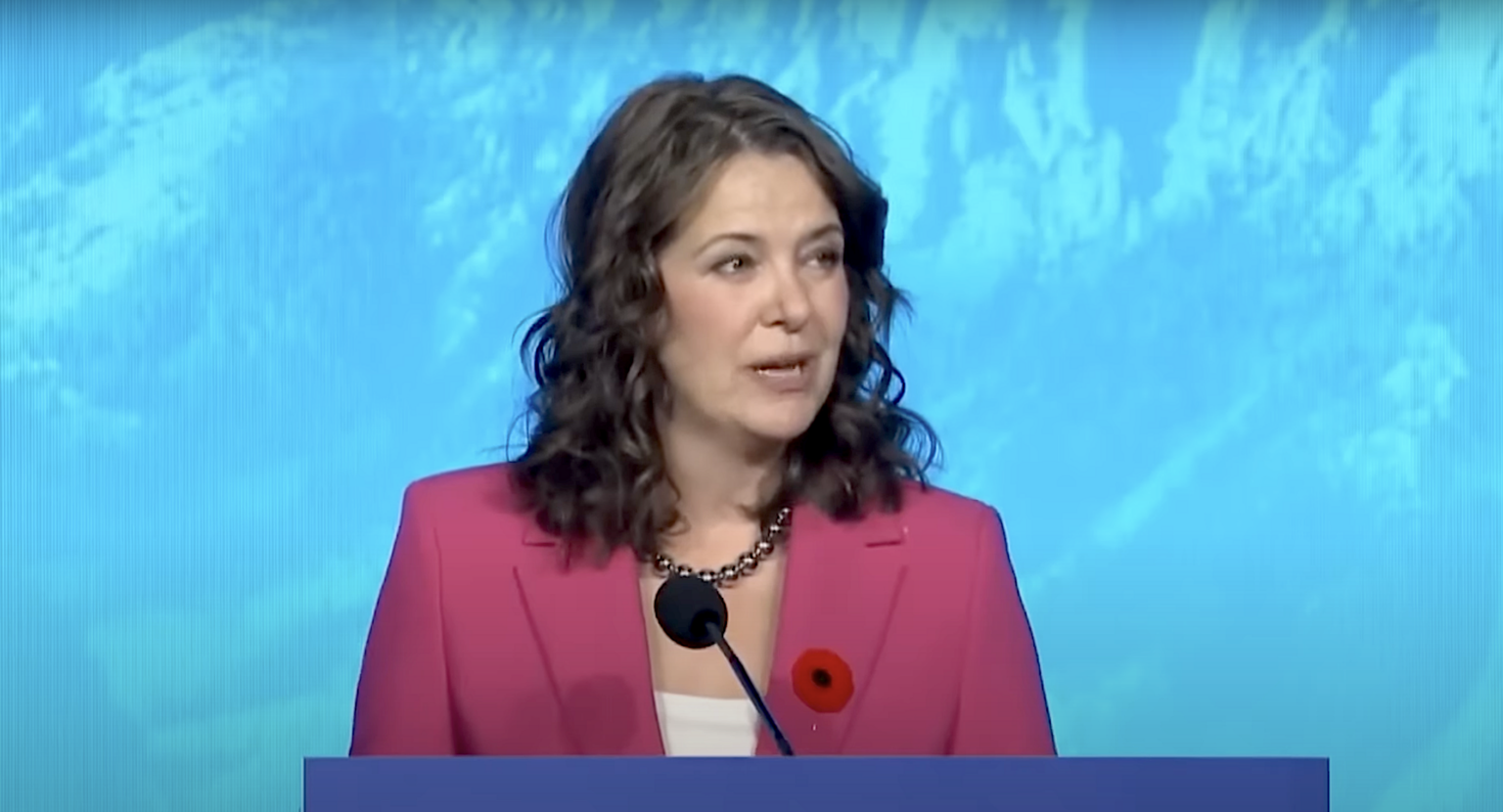Alberta has some serious challenges to deal with. The world economy is decarbonizing, billions of dollars in unfunded oil and gas liabilities have been allowed to accumulate, and many analysts project the pro-drilling policies of the incoming Trump Administration will push prices south of $60 per barrel. But perhaps the biggest crisis facing the province is how the ruling United Conservative Party (UCP) seems to be decoupling from basic facts and reality itself.
The UCP recently held their annual meeting where they debated and dismissed some important laws of physics, like how excessive concentrations of carbon dioxide and other greenhouse gases are dangerously destabilizing our climate. Problem solved.
Subscribe to our newsletter
Stay up to date with DeSmog news and alerts
Rather than fossil fuel-driven CO2 levels being a grave danger to critical planetary systems, resolution 12 stated, “the Earth needs more CO2 to support life and to increase plant yields, both of which contribute to the Health and Prosperity [sic] of all Albertans.”
Almost all delegates voted in favour of wording erroneously stating that current CO2 levels, at 420 parts per million, are “near the lowest level in over 1,000 [sic] years.” This figure is off the mark by about three million years – an era when the Earth was on average about three degrees warmer (up to 20 degrees hotter at higher latitudes) and sea levels were 25 metres higher.
In addition to re-writing thermodynamics, the 6,000 UCP faithful turned their attention to history and geopolitics, approving a resolution that would “protect Crown land from unlawful seizure” by the federal government or the United Nations.
UCP delegates apparently believe the UN is scheming to weaponize the United Nations Declaration on the Rights of Indigenous Peoples (UNDRIP) in a plot to “transfer Crown Lands to First Nations and then to revise international law to seize the lands from the First Nations.”
Seen through this conspiratorial lens, opposing the recognition of Indigenous rights in UNDRIP is not backward-looking bigotry but a righteous battle against what the UCP resolution called “neocolonialism.” Likewise, the resolution on CO2 is framed as a principled action to protect a “foundational nutrient for all life on Earth” rather than a self-interested ploy that would make our climate emergency even worse.
Such woolly-headed magical thinking is what the political left is often accused of. Yet an indulgent and lazy groupthink appears to have taken root at the highest levels in Alberta – a province that in the past has prided itself on straight-shooting practicality.
Peak Delusion
This wishful thinking was on display yet again when energy and mines minister Brian Jean proclaimed, “the truth is we are nowhere near the peak” of global oil demand. “The world experts, the people that are projecting these forecasts professionally, every single expert agrees that the oil and gas sector is going to be strong for years to come,” Jean told Lakeland Today.
The know-nothing pinkos over at the International Energy Agency (IAE) – billed as “the most authoritative global source of energy analysis and projections” – do not agree. “Clean energy momentum remains strong enough to bring a peak demand for each of the fossil fuels by 2030,” states the IEA in their recent World Energy Outlook 2024 report. The authors state plainly that the “direction of travel under today’s policy settings is clear. Continued growth in global energy demand post-2030 can be met solely with clean energy.”
Analysts at Oilprice.com just predicted a “sizeable surplus” in the oil market next year due to four consecutive months of declining oil demand in China. RBN Energy flagged ballooning sales of electric vehicles in China as structural change in global oil markets, resulting in “Chinese gasoline demand to peak either this year or next.” Not even the ongoing armed conflict in the Middle East has caused a bump in global oil prices.
The OPEC cartel has successfully inflated oil prices for decades, but the wheels appear to be falling off their lucrative cooperation as the end of the age of oil approaches. Last month Saudi Arabia reportedly warned other producers that global prices could plunge to $50 per barrel if they boost production to retain market share – though they now claim this conference call never happened. Expect more disruptive drama on global oil markets in coming years as coordinated production collapses, which would have grave implications for high-cost producers like Alberta.
Market analysts believe the recent re-election of Donald Trump and his pro-drilling and trade tariff policies will further accelerate a global oil glut. Virtually all Canadian crude is also sold to the U.S. and it remains to be seen if Trump’s proposed 10 percent tariff on all U.S. imports will apply to the 3.3 million barrels that cross the border each day – 87 percent of which comes from Alberta.
Rather than meeting these challenges by skating towards where the puck is going, the UCP continues to rush towards where it used to be. Alberta needs clear-headed leadership to meet these many pressing problems in a rapidly changing world. Wishful thinking and indulgent reality denial will only make matters worse.
In other words, grow up Alberta. You’re behaving like a bunch of hippies.
Subscribe to our newsletter
Stay up to date with DeSmog news and alerts






